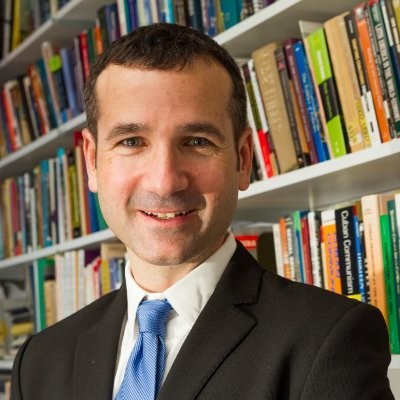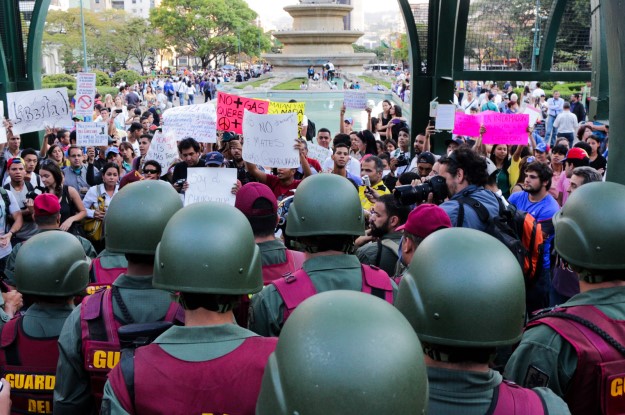Venezuela’s opposition is perhaps one of Latin America’s most criticized political forces. Even within the opposition itself, critics abound. Every opposition voter I meet has a long list of complaints about the Democratic Unity Roundtable (MUD, in Spanish), the grand coalition of parties that since 2008 has led the opposition to Chavismo and now President Nicolás Maduro. Self-flagellation seems to be the MUD’s dominant political ideology.
It is easy to understand why the opposition gets little respect. Eighteen years after the election of Hugo Chávez, the opposition has not yet been able to unseat Chavismo. It is tempting to conclude that the opposition has been ineffectual.
But if we leave aside that main goal, what we find is a long list of political triumphs. Today, Chavismo is cornered electorally, and this has been the result of effective political work. Here’s my list of the opposition’s most significant achievements:
1. Fighting voter abstention
When the first round of protests against Chavismo failed (2001-04), the opposition entered a somber phase. The typical attitude of opposition voters after 2004 was to abstain from voting. The thinking was: Why participate in elections when the rules are stacked against the opposition and the prospects of defeating Chavismo are zero?
Abstention rises when electoral uncertainty declines – that is, when voters can predict who is likely to win. Semi-authoritarian regimes like the one Chávez established strive precisely to lessen electoral uncertainty when they manipulate electoral rules to their advantage. Discouraging abstention is thus one of the toughest challenges in these regimes. And on that score, the MUD has been a resounding success. After initially misfiring by boycotting the 2005 legislative election, to its detriment, the opposition transformed itself since into a magnificent get-out-the vote machine. Its votes have increased steadily since. This was the result of smart campaigning and, specifically, convincing members that, despite biased rules, it was better to participate than to stay home.
2. Fighting electoral irregularities
While the opposition has never managed to end the “uneven playing field” that characterizes Venezuela’s electoral process, it has single-handedly ensured that electoral authorities cheat a lot less than they would have. Chavistas held a total of 19 national elections until 2015. Almost every one of them brought gross irregularities, mostly in the implementation of rules during campaigns. For each contest, the opposition played a major role in detecting irregularities, making an issue out of them, and often forcing electoral officials to make amends. It did this with virtually no international help (since 2006, electoral observers have been banned in Venezuela).
Of course, not all demands for electoral reforms were met, and the government got away with important irregularities in almost every election. Still, after 2006 the opposition managed to avoid some of the worst possible excesses (e.g., voter identity violations, fraud at the voting booth, informational blackouts on election nights). Over time, it became harder for Chavismo to commit fraud on election day. This was the result of pressure, successful recruitment of electoral observers, and savvy investigations.
3. Fighting media blackouts
Chávez’s and Maduro’s assault on traditional media has been unprecedented in Latin America. Through fines, hostile takeovers, and censorship, the government has rendered most of Venezuela’s TV channels and newspapers into pro-government or uncritical voices. For the 2015 legislative elections, even “independent” TV channels hardly covered the activities of the opposition. And yet, opposition leaders have managed to gain enormous name recognition, and to disseminate information that the government wants to hide.
Venezuela’s media blackout is strongest in poor and rural areas. And it is there where the MUD has managed to make most important inroads. Rural and poor regions used to be safe bastions of Chavismo. By 2013, they became highly competitive arenas, with Chavismo losing its unrivaled advantage. No doubt, the MUD could still be criticized for failing to reach out to important disaffected Chavista constituencies. But the turning around of important bastions of Chavismo is undeniable, and it was accomplished without the help of the media, but rather, by the MUD’s dedication to territorial expansion. This expansion in the 2010s is as significant as Chavismo’s expansion in the early 2000s.
4. Unity
Most commentators continue to repeat that the Venezuelan opposition is disunited. But what is more noteworthy about the MUD is how instances of unity far outnumber instances of disunity. Many analysts confuse internal diversity with lack of unity. The MUD is no doubt internally heterogeneous. Comprised of 15 political organizations, the MUD groups soft and hard-liners; right wingers and left wingers; large parties and small parties. This makes the MUD one of the most pluralist coalitions ever assembled in Latin America. It is bound to have internal disagreements about everything.
But where it matters the most—in electoral contests—the opposition has been superbly unified. That is why political scientists make a distinction between internal disagreements and party fragmentation. Venezuela’s opposition suffers from the former but not the latter, which is good and unusual. Fragmentation is devastating at election times because it favors the incumbent. Fragmentation is also common in Latin America, but not in Venezuela.
Part of the explanation for non-fragmentation is the lack of second rounds. Where they exist, second rounds encourage party fragmentation. But even among the Latin American countries without second rounds (Honduras, Mexico, Nicaragua, Panama, Paraguay), the opposition still tends to fragment. Furthermore, unity has prevailed in Venezuela even during non-presidential elections. This too has to do with electoral rules, specifically, the majoritarian bent of Venezuela’s electoral laws for legislative elections. Inadvertently, this system designed by chavistas to help them, encourages opposition unity because it discourages small parties. Even so, it is rare to find bipartisan systems in Latin America, even where electoral rules discourage small parties. Venezuela is thus a remarkable exception.
No doubt, unity has not been achieved 100 percent of the time in Venezuela. There was an important division in 2014 about the merits of street protests, for instance. In addition, unity has not always been attained by transparent processes. But the key point is that the MUD has resisted the pressures to fragment exactly when temptations to do so are stronger—during elections.
5. Surviving despite shackled leaders
Starting in 2008, Chavismo introduced measures targeting opposition leaders directly. Some MUD leaders were either disqualified from running for office (e.g., Leopoldo López, Manuel Rosales), or, if in office, denied public resources. Maduro doubled down on this strategy. He not only arrested Leopoldo López and Antonio Ledezma, but banned 10 opposition candidates from running in the 2015 legislative elections, and more recently, Henrique Capriles.
In most other countries, this kind of decapitation would have been lethal for the opposition. But in Venezuela, it actually served to galvanize the opposition. The fact that the MUD is a coalition helped it survive this blow. As a coalition, the MUD is not dependent on one leader and thus has a higher chance of surviving the political demise of some of them. Either way, the strengthening of the MUD despite bans on leadership is another of the opposition’s unexpected triumphs.
6. Erasing Chavismo’s electoral advantage
Because of the above, the MUD has completely reversed Venezuela’s key electoral cleavage since 1998. Today, it is the opposition that has the vast majority of support, not the government – a reversal of fortune unimaginable five years ago.
Compare this achievement with the status of the opposition in the four other big countries aligned ideologically with Chavismo. In Cuba, the opposition is severely repressed. In Nicaragua, it’s virtually inconsequential electorally. In Bolivia and Ecuador, the opposition has gotten stronger, but at best, they are on par with, not more powerful than, the ruling party. By contrast, the opposition in Venezuela is majoritarian, and it is cornering the government.
7. Changing its international image
During most of the Chávez era, the opposition was seen abroad as “golpista” and the government as “constitucionalista.” This led to a serious legitimacy problem for the opposition in international fora. Today, the opposition has managed to flip those images. The MUD is now seen as “constitucionalista” and the government as “golpista.” By containing violence within its ranks, participating in dialogue when needed, and demanding changes that are based on constitutional rights (e.g., elections), the opposition has performed one of the greatest image recovery feats in history.
Today, most governments in the Americas see the Maduro administration, and not the opposition, as the threat to the constitution, and rightly so. The government has blocked or postponed three elections (a recall referendum, an election for governors, and local elections). It has publicly abolished separation of powers by dictating what the supreme court should opine. And it has engaged in repression of protesters and opposition leaders. The opposition’s demands have not changed much since 2008. What has changed is its international image, and that is the result of successful diplomacy by the opposition.
8. Moving target
All these results are impressive in their own right, but they are even more impressive considering that the opposition has always faced a moving target. Chavismo proved to be non-static. At different periods, it posed different challenges to its opponents. In the early 2000s, the key challenge was Chávez’s spectacular honeymoon and the irrepressible passion of his newly-mobilized followers. In 2004-2008, the key challenge was the unprecedented consumption boom generated by the state. In 2008-2013, it was the stranglehold that Chavismo developed on key institutions and the rise of persecution. In 2013-2014, it was the fetishization of Chávez’s death. And since 2015, the rise of hunger, the end of elections, and hyper-militarization. The MUD needed not only to survive but also to develop new strategies during each phase of Chavismo.
This latest phase is especially challenging. Elections have been suspended, which is where the MUD developed its strongest advantage. And popular support for Chavismo has been replaced by militarization. Today, Chavismo is nothing more than a military junta designed to protect narco-mafias and speculators, supported by paid mercenaries (colectivos). Fighting Maduro has thus become less an exercise on fighting for liberal democracy and more an exercise on fighting a criminal organization. No Latin American opposition faces this type of challenge.
It is too facile to argue that the opposition is doing well because the government (and the economy) started doing poorly in 2014. The MUD’s ability to weaken Chavismo began much earlier. No doubt, the current economic collapse has helped. No doubt, there was a lot of trial and error during this fight – especially the latter. But it’s important not to overlook what is perhaps one of the most important political stories of Latin America of the last decade: the Venezuelan opposition’s rise from the ashes.
The MUD may not have succeeded in stopping the government’s march toward authoritarianism and militarization. But to its credit, the MUD has made this march costlier than Chávez or Maduro ever imagined.
—
Corrales is professor of political science at Amherst College and member of the editorial board of Americas Quarterly. The second edition of his co-authored book Dragon in the Tropics: Venezuela and the Legacy of Hugo Chávez came out in April 2015.








